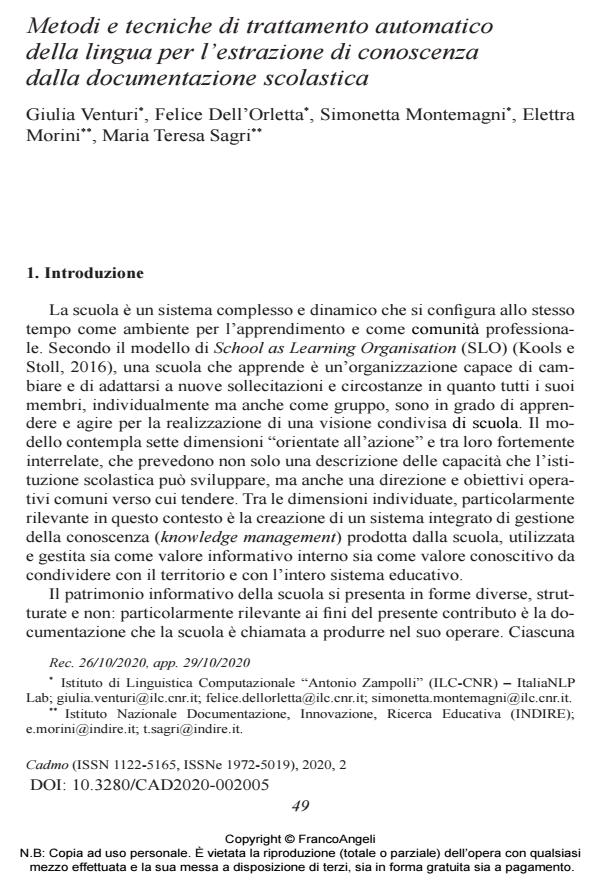Natural Language Processing Methods and Techniques for Knowledge Extraction from School Reports
Journal title CADMO
Author/s Giulia Venturi, Felice Dell’Orletta, Simonetta Montemagni, Elettra Morini, Maria Teresa Sagri
Publishing Year 2020 Issue 2020/2
Language Italian Pages 20 P. 49-68 File size 301 KB
DOI 10.3280/CAD2020-002005
DOI is like a bar code for intellectual property: to have more infomation
click here
Below, you can see the article first page
If you want to buy this article in PDF format, you can do it, following the instructions to buy download credits

FrancoAngeli is member of Publishers International Linking Association, Inc (PILA), a not-for-profit association which run the CrossRef service enabling links to and from online scholarly content.
In its daily activities, the school produces large amounts of textual data in response to different needs, ranging from planning activities, to supporting internal and external communication and self-assessment. These data represent a vast and varied information asset which needs to be profitably analysed to monitor and study ongoing phenomena in the field of education. To profile the contents conveyed by this continuously growing documenta¬tion, we propose advanced methods and techniques for knowledge extraction based on language technologies. The paper illustrates the first and promis¬ing results of the proposed methodology for monitoring educational strategies through time, space and different types of schools, starting from free texts. The methodology has been tested within two scenarios focusing on i) the analysis of the strategic choices and actions implemented by schools to achieve improvement and innovation objectives, and ii) the monitoring of the technical-professional and soft skills developed in School-Work Alternation experiences. Although preliminary, achieved results show that Natural Language Processing enabled methods and techniques can lead to effective and exhaustive school profiling.
Keywords: School system monitoring, educational data mining, big data, natural language processing, knowledge extraction.
- Police cultures. The construction of a collective imaginary for theguardie di Pubblica sicurezza, 1949–1960 Michele Di Giorgio, in Journal of Modern Italian Studies /2022 pp.224
DOI: 10.1080/1354571X.2021.2009219
Giulia Venturi, Felice Dell’Orletta, Simonetta Montemagni, Elettra Morini, Maria Teresa Sagri, Metodi e tecniche di trattamento automatico della lingua per l’estrazione di conoscenza dalla documentazione scolastica in "CADMO" 2/2020, pp 49-68, DOI: 10.3280/CAD2020-002005